CULTURAL INSIGHTS: DISPELLING MISCONCEPTIONS ABOUT CHINA
For many years I’d been eager to travel through China. Simultaneously, I’d been equally hesitant to go because of my perceptions of China: packed with super-noisy, super-messy, phlegm-spitting Chinese citizens; shady aggressive business tactics; and great difficulty getting around.
Those were images I’d developed both from other travelers’ stories and my own experiences meeting S.E. Asian Chinese during the previous 10 years of travels. More recently, in preparing to move to Shanghai, I’d repeatedly heard tales of horrific air pollution, dangerously chaotic traffic, difficult language barriers, plus all my previous concerns confirmed.
Needless to say, I set off to Shanghai quite curious but rather skeptical about my next home in Asia.
Here’s what I feared:
* NOISE – constant noise- loud, yelling conversations and deafening traffic
* CONSTANT SPITTING – hawking, throat clearing, phlegm flying
* COMMUNICATION PROBLEM – practically nobody speaks English
* SEVERE AIR POLLUTION – thick murky, stinky air
* CHILDREN – masses of bratty, noisy, racing-around, uncontrolled children. * DIRTY. garbage, dirt and mess everywhere
* DANGEROUS CHAOTIC TRAFFIC
* RIP-OFFS – greedy, ‘cheating’ hard-as-balls, argumentative shop keepers pushing their wares and taking as much as they can get
| Puxi district of Shanghai, China |
Here’s what I found:
** NOISE–
Noise was my longest-standing worry about traveling through China. I feared I’d never get a full-night’s peaceful sleep. I also thought I’d be constantly surrounded and bombarded by LOUD YELLING CONVERSATIONS.
After traveling around SE Asia for 10 years and meeting scores of SE Asian Chinese, I believed my fears were well-founded. I can’t count how many times I’ve stayed out ‘Chinese style’ hotels, always to find them impossible to sleep at due to noise levels.
You see, the walls of rooms don’t reach the ceiling (! ) creating a 1-2 foot opening at the top of all walls throughout the hotel. That means all the noises from every room, hallways, reception, stairwells reach your room!
Even if the walls are thick, all noises carry throughout the hotel.
My travels around SE Asia are also riddled with episodes of sitting on buses, planes, and in restaurants with Chinese YELLING to each other as if they’re in a forest, miles apart, while in fact, they’re sitting close enough to touch one another. Their voice levels are just astounding. How was I going to deal with an ENTIRE NATION of people YELLING?
| Once I reached Shanghi, to my great delight and astonishment, I discovered QUIET! My friends, who invited me to stay with them, lived in a tall modern apartment building, on the 25th floor. That means QUIET! The walls reach the ceilings! We’re far up from street noise. Condo neighbors are fairly quiet. I could sleep well, even without my ear plugs. There aren’t too many places in SE Asia I can do that on a regular basis. Amazingly, it was quieter at night in Shanghai than many other places I’ve traveled in Asia. |
Equally astonishing, very few people were yelling. Most people spoke quietly or at normal volumes. Walking around outside, it was actually quiet, even on crowded streets. Locals don’t actually talk so very much. Wow! Of course, now and then I bumped into a Yeller- sometimes in a shop, a restaurant, a bus, an elevator. Maybe once or twice a day. Maybe not at all. As for those YELLERS, I most commonly came across them in restaurants, especially in the evenings, when they gather in groups to eat and drink. When they start drinking, the volume goes up dramatically. It can be literally deafening. Try eating a meal in that environment. Luckily, I found it sooo ridiculous that I just had to laugh. Ahh those crazy Chinese! ** AIR POLLUTION– Just before moving to Shanghai I met many westerners living in the city. All of them mentioned the extremely bad air pollution. One athletic American woman told me that she and her husband were unable to jog outside because the air quality was so poor. Another woman with asthma told me her symptoms were much worse in Shanghai, to the point that she had difficulty living there. Several people told me simple colds take much longer to get over. After all those stories I wasn’t exactly sure what to expect. Was I going to enter a thick smoggy cloud, never to see direct sunlight until I left? Was the air going to stink? Were there going to be little black bits floating through the air? Would everyone be wearing cloth face masks outside? I was a bit concerned.
| Shanghai skylikne from my 25th floor balcony |
On my flight to Shanghai, upon approaching the city, but still many miles away, I noticed a gigantic brownish ‘cloud’ down below where, just previously, I could see the earth. Hmmm… Was that Shanghai smog I was about to plunge into? And once I entered, would I be able to see the sun? The blue sky? Soon enough our plane entered the smog zone and… Hey, I could still see the earth inside. We landed. At ground level I couldn’t actually discern any ‘smog’ or ‘haze’ or ‘white air’. I couldn’t smell anything. In fact, it proved to be a rather clear and sunny day. Surprise: even inside a smog cloud you can see the sky. The following day I awoke to bright blue skies and sunshine. Soooo, what were all those tales of horrid air pollution? Just more urban legends, it appeared. A few days later, up in my 25th floor apartment, I awoke and looked out the window… pure white. That’s it. No buildings. No street below. No sky. I was astounded. It literally looked like I was inside a cloud. I’ve actually been inside real clouds on top of mountains on several occasions, so I’m speaking literally here) Ohh! That was an entirely different kind of day in Shanghai. After living in Shanghai nearly 3 months, I found that weather and air quality vary tremendously from day to day. There are clear, sunny, bright blue sky days. Rainy days. ‘White sky’ days. Sometimes air quality is bad, sometimes it’s good. At least it’s not continuously horrendous. In the meantime, I did distinctly noticed the affects of poor air quality on my respiratory system. To put it simply, I arrived from KL, Malaysia with some sort of ‘cold’ or ‘virus’ and could not shake it off for 6-7 weeks. It left me completely exhausted most days. I’d start to recover, then would go out for a walk and I quickly get knocked back down. I finally concluded it was, indeed, poor air. I was only able to recover by finally taking a course of antibiotics. Even though Shanghai’s air doesn’t look or smell so bad most days, it does seem pretty UNhealthy, just as reported by the other westerners I’ve met here.
| Shanghai locals enjoying games outdoors |
** CONSTANT SPITTING– Perhaps it’s just Shanghai, as a more westernized Chinese city; perhaps it was new policies leading up to the 2008 Olympics in Beijing; perhaps it was changing habits. For whatever reason, there’s not much spitting going on in Shanghai. Hallelujah! I can’t say there’s no spitting. Just about everyday I did see one or two older men spitting, mostly on the streets, but sometimes in the most astounding places, including the lobbies of modern skyscrapers, in elevators, and on restaurant floors. Eeewwww! Considering I had expected to be continuously surrounded by people hawking and spitting, Shanghai was not so bad on the spitting front. Basically, it’s simply a minor unpleasantry, much like men peeing in public, which is a part of life in SE Asia that I’d grown accustomed to long ago.
| Clean, modern Shanghai streets and apartment buildings |
** DIRTY– I was completely wrong about this one. Shanghai is incredibly clean. Roads and sidewalks are clean. There’s no garbage or dirt laying around. Trash cans are abundant. Construction sites are walled off from the public. Coming from SE Asia, Shanghai is immaculate. ** COMMUNICATION PROBLEMS– Before moving to Shanghai many westerners living there had told me it was ‘challenging’ living because nobody speaks English. They made it sound practically impossible to communicate, buy things, or get around. Even though I’d been traveling around SE Asia for 10 years, and communicating quite easily for the most part, I began to wonder if I was about to enter an entirely new realm. It is true that most Chinese do not speak English. Why should they? They’re in China. However, I generally found that to not be much of a barrier to communicating. I would point, use hand signals, look at registers or calculators for prices, use facial expressions, write things down, and so on. I had entire conversations with local Shanghai people without any of us speaking each other’s language.
| selecting food at Shanghai street stalls |
On my very first day in Shanghai, I wandered around the old streets near my apartment building and, without speaking a word of Mandarin or Shanghainese, I was able to buy a pair of gloves, eat 2 or 3 meals and buy groceries. Of course I do have 17 years’ experience living and traveling in Asia. And I’m not too shy nor afraid of making mistakes/ looking foolish. Perhaps communicating without a common language requires certain attitudes. Of course the degree of communication success depends greatly on the intelligence or cleverness of the person you’re trying to communicate with. I interacted with some amazingly clever people who quickly figure out ways to make me understand them. I also had exasperatingly failed exchanges with pretty dim-witted folks who couldn’t grasp the most simple gestures or those who wouldn’t even try, due to fear or disinterest. Overall, though, I found it pretty easy to get what I needed. In the end, I could always seek out English speakers for help, especially on important matters like visas. Personally, I found other westerners’ cries of ‘difficult’ and ‘challenging’ quite puzzling. Who were those people who couldn’t figure out how to communicate? * RIP OFFS– I’m not sure why, but I’ve long held the belief that Chinese are very aggressive, pushy and sly at business practices. I imagined them trying to ‘rip off’ customers by quoting high prices and to push, manipulate and goad customers into buying. I further imagined heated, LOUD bargaining ‘arguments’. Happily, I discovered a very different shopping reality in Shanghai. In direct contrast to my imagination, I found local shopkeepers, for the most part, rather humble, friendly, honest and non-aggressive. (as far as I know!%$^!) Prices were marked on most merchandise, which made buying easy. Most fresh foods like fruits and vegetables, duck and chicken, and eggs are sold by weight. Shopkeepers put their goods on the scale, then showed me the weight and price before concluding the sale. Prices quoted to me were quite low, so I assume shopkeepers were giving me the correct, local, unadjusted prices. Of course, I could be wrong and they were all inflating prices with me. But since I’d already shopped at street markets and local shops throughout SE Asia for 10 years, I think I’ve got a pretty good idea of what prices should be. I did come across a few shopkeepers in Shanghai who were clearly setting prices too high. It seemed I could tell the difference. Most obviously, it’s easy to see people’s character. I can see they are being honest, giving me the usual prices. Probably they just don’t have any foreign customers, so they don’t have any ‘culture’ to ‘rip off’ tourists, like many areas in SE Asia that western tourists frequent. In any event, I’m glad I was wrong about ‘aggressive, cheating’ Chinese. It was a very pleasant surprise to discover how friendly and honest Shanghainese locals were. ** CHILDREN– Anyone who knows me knows my pet peeve is noisy and hysterical, hyper-active children. I had become exceptionally annoyed living in SE Asia since kids are EVERYWHERE, permeating all facets of life. All day long, at shops, restaurants, museums, buses, you name it, there are noisy kids around. I expected Chinese kids to be even worse, especially boys, who are treated as little princes, particularly since the era of China’s ‘one child’ policy. I hoped I wasn’t about to enter a ‘Lash nighmare’ on earth! As it turned out, I didn’t completely understand the implications of the ‘one child’ policy. It means that percentage-wise of the population there are very few kids around. Yippie. There were certainly fewer children around than in other Asian countries. On top of that, for some reason, Chinese kids are mostly pretty darn quiet. Maybe it’s because they live as single children? Whatever the reason, that was practically a miracle to me. In fact, I actually found many of those quiet, well-behaved, rosy-cheeked children very cute and endearing.
| Shanghai’s chaotic traffic |
** DANGEROUS CHAOTIC TRAFFIC– Shanghai traffic is, in fact, quite chaotic. However, no more chaotic than all the SE Asian countries I’d been traveling through for 10 years. In fact, to some extent Shanghai traffic is easier to negotiate by bicycle than some other places I’d cycled. In fact, it appeared so ‘easy’ to me that I went out an bought myself a bicycle and began cycling almost daily around the city. Chaotic traffic just seems to be an Asian style. Once you get used to it, you realize it actually works quite well. Instead of having loads of rules to follow, the drivers, cyclists and pedestrians all work it out themselves, as they go. Nobody wants to die or have an accident, after all. Everyone is just trying to reach their destination. They all manage to not hit each other- by swerving, slowing down, speeding up and changing lanes. Read more about Shanghai’s chaotic traffic in my story ‘Cycling in Shanghai‘. **************** That pretty much covers my ‘straightening out’ on life in China. Happily, most of my worries and negative ideas were quite unfounded. It’s much more pleasant in China- at least in Shanghai- than I’d imagined. It just goes to show me not to necessarily believe rumors or other peoples’ views on places they’ve visited. Have you been to China? What were your impressions? Have you ever had expectations of a place, then find out you were wrong? If so, share your story! You might also like: 10 Free Things to do in Shanghai Life in Shanghai Acquiring a Shou Ma Cycling in Shanghai Curiosities of Shanghai 2012 Calendar: Shanghai Modern 2012 Calendar: Traditional Shanghai


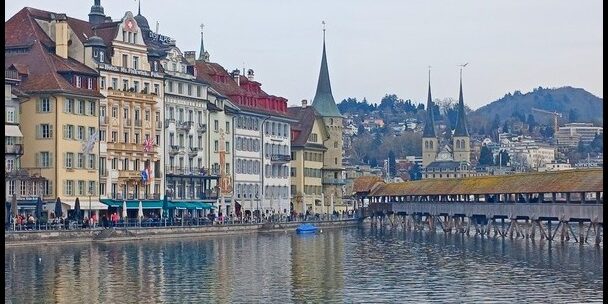

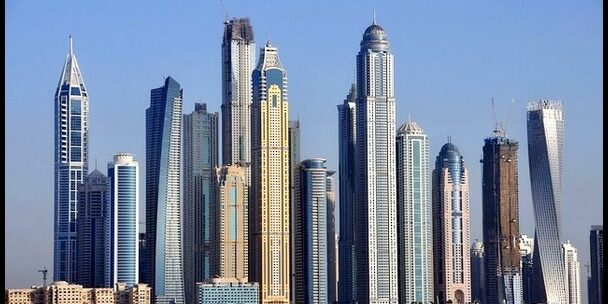

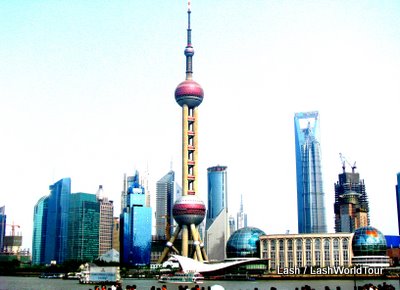
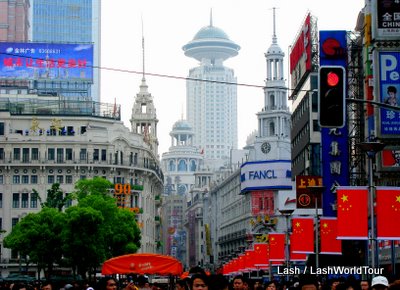

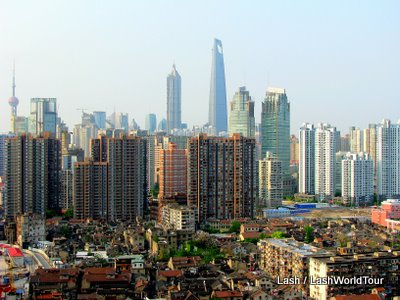

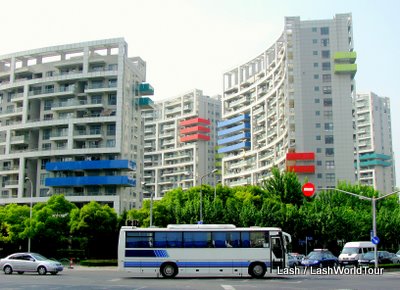
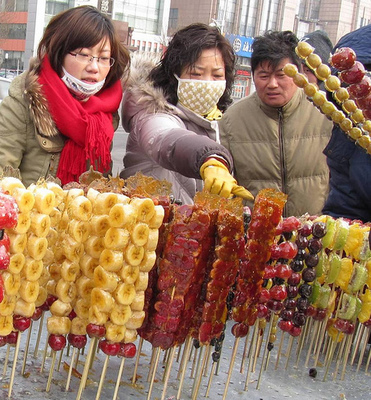
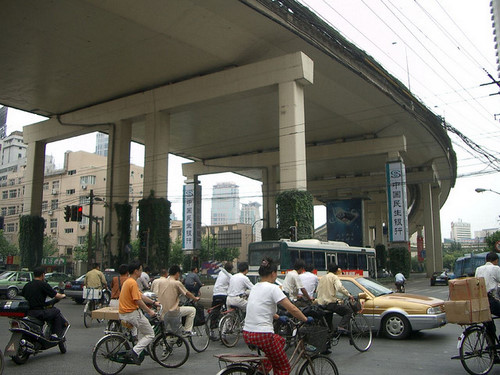


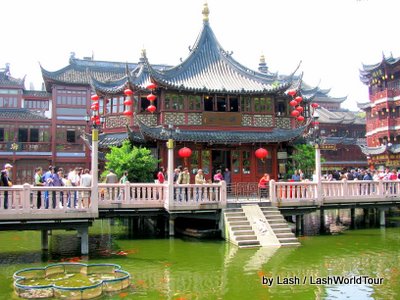


 Hi! I'm Lash, an American nomadic world traveler who's been traveling solo since 1998. I’m passionate about traveling the world nomadically and then sharing it all with you. I hope to inspire you to travel the world, to entertain you with tales from the road, and to help you reach your travel dreams. Welcome!
Hi! I'm Lash, an American nomadic world traveler who's been traveling solo since 1998. I’m passionate about traveling the world nomadically and then sharing it all with you. I hope to inspire you to travel the world, to entertain you with tales from the road, and to help you reach your travel dreams. Welcome! 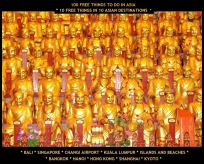


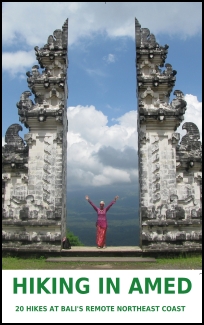
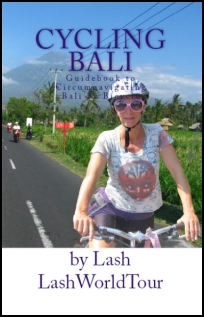
2 pings